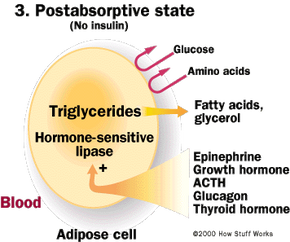Breaking Down Fat
When you are not eating, your body is not absorbing food. If your body is not absorbing food, there is little insulin in the blood. However, your body is always using energy; and if you're not absorbing food, this energy must come from internal stores of complex carbohydrates, fats and proteins. Under these conditions, various organs in your body secrete hormones:
- pancreas - glucagon
- pituitary gland - growth hormone
- pituitary gland - ACTH (adrenocorticotropic hormone)
- adrenal gland - epinephrine (adrenaline)
- thyroid gland - thyroid hormone
These hormones act on cells of the liver, muscle and fat tissue, and have the opposite effects of insulin.
Advertisement
When you are not eating, or you are exercising, your body must draw on its internal energy stores. Your body's prime source of energy is glucose. In fact, some cells in your body, such as brain cells, can get energy only from glucose.
The first line of defense in maintaining energy is to break down carbohydrates, or glycogen, into simple glucose molecules -- this process is called glycogenolysis. Next, your body breaks down fats into glycerol and fatty acids in the process of lipolysis. The fatty acids can then be broken down directly to get energy, or can be used to make glucose through a multi-step process called gluconeogenesis. In gluconeogenesis, amino acids can also be used to make glucose.
In the fat cell, other types of lipases work to break down fats into fatty acids and glycerol. These lipases are activated by various hormones, such as glucagon, epinephrine and growth hormone. The resulting glycerol and fatty acids are released into the blood, and travel to the liver through the bloodstream. Once in the liver, the glycerol and fatty acids can be either further broken down or used to make glucose.
Losing Weight and Losing Fat
Your weight is determined by the rate at which you store energy from the food that you eat, and the rate at which you use that energy. Remember that as your body breaks down fat, the number of fat cells remains the same; each fat cell simply gets smaller.
Most experts agree that the way to maintain a healthy weight is:
- Eat a balanced diet - appropriate amounts of carbohydrates, fat and protein
- Do not eat excessively - for most people, a diet of 1,500 to 2,000 calories a day is sufficient to maintain a healthy weight
- Exercise regularly
Related Articles
- How Body Mass Index Works
- How Fats Work
- How Food Works
- How Dieting Works
- How Diet Pills Work
- How the Atkins Diet Works
- How Low-carb Dieting Works
- How Calories Work
- How to Plan a Weight Loss Diet
- How Exercise Works
- How Fat Vaccines Will Work
- How Diabetes Works
- How Heart Disease Works
- How Liposuction Works
- Is a lack of sleep making me fat?
